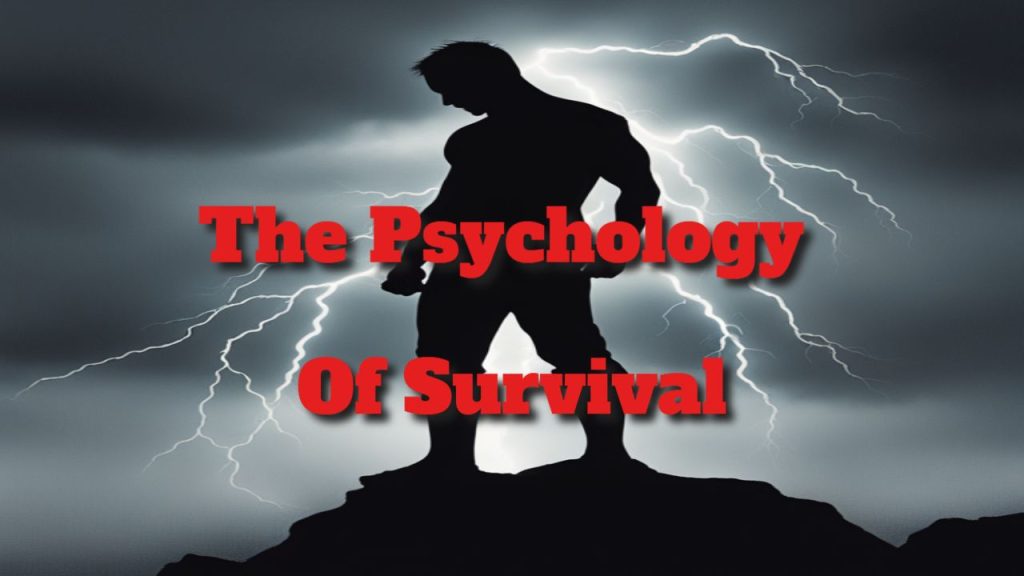Master Survival Psychology: Essential Strategies for Thriving in High-Pressure Situations
The saying “desperate times call for desperate measures” encapsulates the essence of survival, particularly when we delve into the nuanced aspects of survival psychology. In the face of intense threats, our minds undergo a significant transformation, unleashing reservoirs of strength and resilience that typically lie dormant in our daily lives. This transformation goes beyond simple reactions; it involves a thorough mobilization of our mental and emotional resources, highlighting the remarkable abilities our minds possess when confronted by adversity. Gaining an understanding of these psychological shifts is not just beneficial but imperative for anyone aiming to refine their survival skills and bolster their mental resilience, especially in life-or-death situations.
In critical moments of danger, a complex interplay of psychological mechanisms is activated. What exactly transpires within our minds when urgency is paramount? How do we navigate pivotal decisions amid overwhelming pressure? Additionally, how does our inherent psychological framework influence our ability to endure, adapt to, and ultimately thrive in chaotic environments? These questions are central to comprehending the intricacies of survival psychology, a theme we will explore in depth throughout this detailed article. By illuminating the core components that empower us to withstand stress, we can uncover valuable insights into our intrinsic capabilities and behavioral patterns during crises.
Join us on an enlightening journey into the fascinating world of survival psychology, where we will unravel its complexities and reveal the vital factors that dictate our ability to overcome challenges and emerge victorious in life-threatening situations.
Understanding the Influence of Fear on Survival Instincts and Responses
Fear is a fundamental element of our survival instincts, serving as a primal response that equips our bodies to react swiftly to potential dangers. This powerful emotion initiates a series of physiological reactions designed to increase our chances of survival during perilous encounters. When fear grips us, our bodies undergo significant physiological changes: heart rates surge, breathing quickens, and muscles tense, resulting in a heightened state of awareness that prepares us for immediate action. Recognizing these physiological responses is vital for anyone seeking to enhance their survival reactions and overall mental preparedness.
This acute readiness sharpens our reflexes and fosters rapid decision-making, enabling us to effectively address imminent threats. Furthermore, fear heightens our sensory awareness, allowing us to perceive our environment more acutely and identify dangers that may have otherwise gone unnoticed. It compels us to focus intently on our surroundings, enhancing vigilance and assisting us in recognizing critical warning signs essential for survival. Without the presence of fear, our ability to navigate hazardous situations could be severely compromised, underscoring its crucial role in our survival toolkit. By understanding the intricate relationship between fear and survival mechanisms, we deepen our appreciation for the complexities of human experience while gaining practical knowledge applicable in real-world scenarios.
Building Resilience to Navigate Life’s Challenges with Confidence
In moments of fear during high-stakes situations, the ability to cultivate resilience becomes paramount for maintaining the fight for survival. Resilience can be defined as the capacity to bounce back from adversity, adapt to challenges, and recover from setbacks, even when faced with formidable obstacles. This crucial trait often distinguishes individuals who succumb to despair from those who muster the inner strength to continue their survival efforts. Actively cultivating resilience is a proactive measure anyone can adopt to enhance their overall life experience.
However, it is essential to note that resilience does not imply the absence of fear or pain; rather, it embodies a steadfast determination to move forward despite emotional turmoil. This involves nurturing a positive mindset, setting attainable goals, and effectively utilizing available resources to navigate hardships. By fostering resilience, individuals empower themselves to confront life’s hurdles with assurance, equipped with the insights and strategies necessary to succeed. This transformative mindset is beneficial not only in survival situations but also enriches one’s broader life experience by instilling hope and enabling individuals to tackle future challenges with renewed vigor and resolve.
Enhancing Decision-Making Skills Under Pressure for Better Outcomes
The ability to make informed decisions can be severely compromised in high-stress environments. The inherent urgency and pressure characteristic of these critical moments can cloud our judgment, leading to hasty or ill-considered choices. During such stressful episodes, the brain enters a heightened state of arousal, activating the fight-or-flight response, which can overwhelm rational thought processes and compel individuals to rely more on instinct than thoughtful analysis. Recognizing these patterns is essential for developing effective strategies to enhance decision-making capabilities.
This physiological response can impede cognitive functions, making it increasingly challenging to process information and weigh the pros and cons of various options. To counteract these effects, it is vital to understand how stress influences decision-making and to actively employ strategies that mitigate its impact. Techniques such as practicing deep breathing exercises, allowing brief moments of reflection, or consulting with trusted individuals can significantly improve one’s ability to make informed and effective decisions. By sharpening decision-making skills in high-pressure contexts, individuals can markedly enhance their chances of successfully navigating through challenging and potentially life-threatening situations.
The Crucial Role of Social Support in Overcoming Crisis Situations
Recognizing the importance of social support is essential for effectively managing stressful circumstances. A strong network of friends, family, and colleagues provides invaluable assistance and resources, enabling individuals to cope and thrive during difficult times. The emotional reassurance, practical help, and sense of belonging offered by social connections are critical for fostering resilience and enhancing overall well-being. In any crisis, the strength derived from social support can be a transformative factor.
Research consistently shows that individuals with robust social networks experience better mental health outcomes and recover more rapidly from traumatic experiences. Moreover, having a support system enhances problem-solving abilities, offers new perspectives, and provides necessary motivation and encouragement. Acknowledging the transformative power of social networks during crises can significantly alter one’s experience, allowing individuals to draw strength and insight from others when needed. Engaging with a supportive community not only assists in coping with immediate challenges but also contributes to long-term emotional resilience and recovery, reinforcing the notion that we are not alone in our struggles.
 Actionable Coping Strategies for High-Stress Scenarios
Actionable Coping Strategies for High-Stress Scenarios
What practical strategies can be implemented to successfully navigate life-threatening situations? Here are some effective tips:
– Maintain Calmness and Focus: Take a moment to breathe deeply and assess your surroundings before taking action. This approach can clarify your thoughts and sharpen your focus.
Prioritize Safety: Ensure your safety and that of others by seeking shelter or moving away from imminent dangers whenever feasible. Your safety should always be the top priority.
– Stay Aware: Remain vigilant of your surroundings, being alert to potential threats or changes in the environment that could affect your safety.
– Communicate Clearly: If necessary, signal for help or inform others of the danger you are facing. Effective communication can be crucial in survival situations.
– Trust Your Instincts: Pay attention to your gut feelings and make prompt decisions based on the information available. Your instincts can provide invaluable guidance.
– Utilize Available Resources: Make the most of all available tools and resources to enhance your chances of survival, whether they are physical tools or social support.
– Maintain an Optimistic Mindset: Cultivate a belief in your ability to overcome the situation. A positive perspective can significantly influence your resilience and responses.
Effective Coping Strategies for Trauma Survivors and Those with PTSD
For individuals with a history of trauma or PTSD, implementing practical coping strategies during life-threatening situations is essential for managing anxiety and fostering resilience. Tailoring these strategies can empower individuals to regain control over their responses and enhance their overall well-being.
– Practice Deep Breathing Techniques: Use grounding strategies to stabilize anxiety levels and create a sense of calm. Deep breathing helps center your thoughts and reduce panic.
– Seek Social Support: Do not hesitate to reach out to friends, family, or mental health professionals for assistance. Connecting with others can provide critical support during challenging times.
– Engage in Self-Care Practices: Prioritize activities that promote both mental and physical well-being, aiding in recovery and resilience-building over time.
These coping mechanisms are vital for managing anxiety and nurturing resilience. It is important to recognize that resilience is not merely an inherent trait; it can be actively developed through consistent practice and support. With the right strategies in place, anyone—regardless of their background—can improve their ability to bounce back from adverse situations.
Additionally, understanding how decision-making under stress impacts long-term mental health and recovery from traumatic events is crucial. The manner in which decisions are made during high-pressure situations can greatly influence recovery trajectories and overall mental health in the aftermath of life-threatening experiences.
Identifying the psychological barriers individuals face when seeking social support during crises is equally important. Common challenges during these critical moments may include feelings of vulnerability, fear of judgment, trust issues, and difficulties in articulating one’s needs. Acknowledging these obstacles is essential, as they can impede the process of seeking help and exacerbate stress and anxiety.
To effectively navigate these hurdles and access the support needed, consider taking manageable steps such as confiding in a trusted friend, consulting a mental health professional, or joining a support group. Remember that seeking help is a courageous step, and there are people ready and willing to assist you when you need it most.
Exploring the Fascinating Realm of Survival Psychology
The psychology of survival represents a rich and multifaceted field that offers profound insights into human behavior. While anxiety is a natural response to life-threatening events, resilience empowers us to recover from adversity and keep moving forward. By understanding how stress affects decision-making, we can significantly improve our survival chances. Moreover, recognizing the essential role of social support provides the strength and comfort necessary during challenging times.
Employing effective coping strategies enables us to navigate complex and life-threatening situations with greater ease, ultimately leading to enhanced resilience and improved mental health outcomes. This exploration of survival psychology not only deepens our understanding of our own capabilities but also equips us with the practical tools needed to face unforeseen challenges with confidence and determination.
Frequently Asked Questions About Survival Psychology
How do anxiety disorders impact survival psychology?
What psychological differences exist in survival responses between individuals with anxiety disorders and those without?
Individuals with anxiety disorders may demonstrate heightened reactions to fear and stress, while those without may employ more adaptive coping strategies, leading to varying survival outcomes.
What coping mechanisms are most effective for trauma survivors or individuals with PTSD during survival scenarios?
The Article Survival Psychology: Understanding the Mindset Appeared First On Survival Avenue.
The post Survival Psychology: Mastering the Mindset appeared first on Survival Bite.
The Article Survival Psychology: Unlocking Your Mental Resilience Was Found On https://limitsofstrategy.com


Your exploration of survival psychology really resonates with me, especially the notion that intense pressure can reveal hidden strengths. I’ve often found that in challenging situations—whether in a personal crisis or even a competitive environment—there’s a unique shift in perspective that allows us to draw on resources we didn’t know we had.
It’s interesting how those intense moments can really flip our usual way of thinking, isn’t it? When life throws challenges at us, it’s almost like we go through a mental gear shift. Suddenly, things that felt out of reach or impossible become manageable, and we start tapping into strengths we didn’t even realize we had.
“Check this out—it’s just too good to pass up!”
https://cnisclub.org/octopus
You touch on a key aspect of survival psychology. It’s interesting how pressure not only reveals hidden strengths but can also expose vulnerabilities we might prefer to ignore. In a personal crisis, for example, we might not just find resilience; we may also confront fears or flaws that, under normal circumstances, stay tucked away.
Your insights on survival psychology truly resonate with me, especially as someone who has always believed that our mental fortitude plays a pivotal role in overcoming challenges. The notion that our minds can tap into latent reservoirs of strength during crises is both fascinating and empowering. It encourages us to explore not just physical preparedness but also mental conditioning as a vital aspect of survival.
I completely agree with you about the significant role of mental fortitude in overcoming challenges. It’s intriguing how our minds can act as both the first line of defense and a source of untapped reserves during crises. I’ve always found it fascinating how some individuals seem to thrive in high-stress situations, while others struggle.
You bring up an excellent point about the differences in how people respond to high-pressure situations. It really is fascinating how some individuals can tap into their mental resources and rise to the occasion, while others may feel overwhelmed. One aspect that plays a crucial role in this dynamic is our individual mindset and how we approach challenges.
You’re spot on about mental fortitude being the unsung hero in tough situations. It’s like having a Swiss Army knife in your brain—sometimes you just need to remember which tool to use. I always wonder if people who thrive in chaos have secret codes or just a slightly different wiring in their heads. I mean, it’s a wonder to see someone calmly juggling flaming torches while I’m over here trying to figure out if I left the stove on.
It’s great to connect with someone who shares an interest in the complexities of mental resilience. You’re right—it’s fascinating to see how different people respond in tough situations. Some seem to thrive, turning pressure into motivation, while others may feel overwhelmed, even in scenarios that seem manageable.
“Absolutely, it’s remarkable how mindset can shape our responses to adversity. If you’re interested in exploring strategies to build that mental resilience, check out this resource that offers some great insights!”
https://cnisclub.org/quillbot
You hit the nail on the head with that comment about survival psychology. It’s one of those topics that doesn’t get enough airtime, right? Most people think being prepared is all about stashing away canned beans and having a decent first aid kit, but let’s be real—the mind is like that little engine that could.
I appreciate your reflections on this topic. It’s so true that mental fortitude often determines how we respond to adversity. When faced with challenges, many of us discover surprising layers of resilience that we didn’t know existed.
I’m glad to hear that the insights struck a chord with you. If you’re interested in diving deeper into the importance of mental conditioning for survival, I invite you to explore some valuable resources I’ve compiled that can help enhance your mental fortitude even further.
https://cnisclub.org/octopus
Your insights on survival psychology really resonate with me. I’ve often found that high-pressure situations can really reshape how we perceive our limitations. For instance, I’ve experienced moments in my life where the fight-or-flight response kicked in, and I discovered an unexpected well of courage. It makes me think of how crucial mental training is, similar to physical training.
This is such an intriguing topic! It’s wild to think that in those moments where time seems to slow down, our brains can really kick into high-gear mode. Reminds me of that classic survival show where contestants start to realize their hidden talents—like how some can fashion a makeshift shelter using just duct tape and willpower!
This is such an intriguing topic! It’s wild to think that in those moments where time seems to slow down, our brains can really kick into high-gear mode. Reminds me of that classic survival show where contestants start to realize their hidden talents—like how some can fashion a makeshift shelter using just duct tape and willpower!
We often assume that survival instinct kicks in like a light switch during crises, but as you’ve so thoughtfully pointed out, it’s far more akin to a complex symphony playing out inside our minds, each psychological mechanism delicately tuned to the crisis at hand. I can’t help but reflect on my own experiences that speak to this idea.
Your reflection on survival instincts really resonates with me. It’s fascinating how much our minds can process during a crisis, often beyond our conscious awareness. I’ve found that in moments of high stress, there’s this intricate interplay between instinct and logic—where one moment I might feel my heart racing, and the next, I’m strategizing how to navigate the challenge ahead.
It’s interesting how our minds can kick into overdrive when faced with challenges. That tension between instinct and logic can feel almost like a dance, can’t it? In those intense moments, it’s surprising how quickly we pivot from sheer reaction to calculated planning. I often find myself recalling specific instances when seemingly small pressures helped me uncover problem-solving skills I didn’t know I had.
“I’m glad to hear that my reflections hit home for you! If you’re interested in exploring this fascinating interplay between instinct and logic further, I invite you to check out this resource that dives deeper into the science behind our responses in crisis situations.”
https://cnisclub.org/octopus